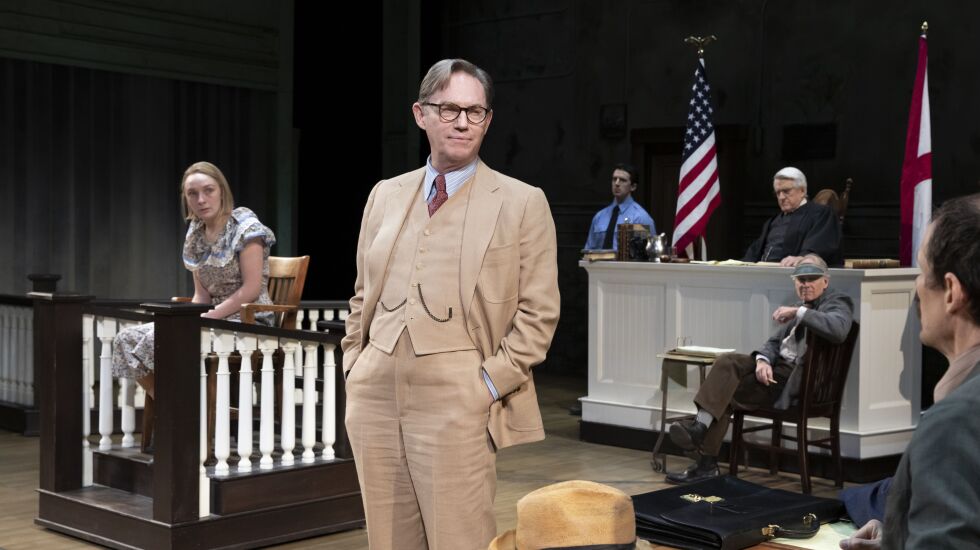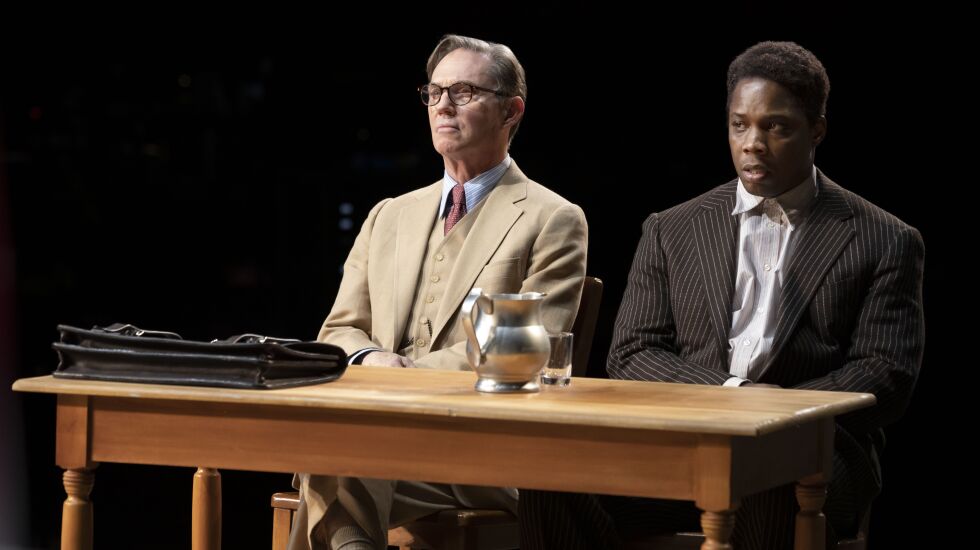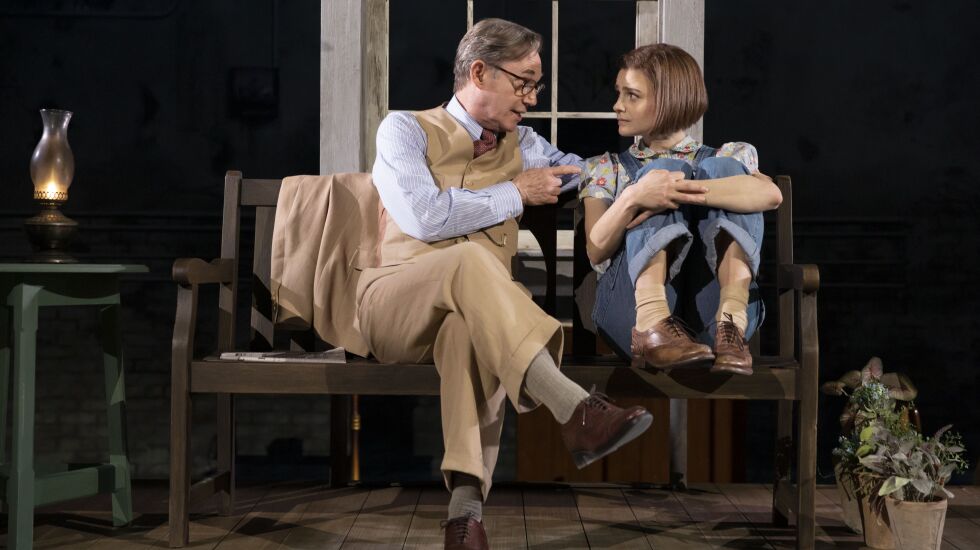
Atticus Finch, a beloved character in Harper Lee’s novel “To Kill a Mockingbird,” most famously played by Gregory Peck in the 1962 film of the same name, has for over half a century been considered a paragon of virtue.
But should he, in today’s parlance, be cancelled?
Playwright Aaron Sorkin’s new adaptation of “To Kill a Mockingbird” — now playing in an impeccably produced national tour replete with an extraordinary ensemble cast led by Richard Thomas as Atticus — toys with that question.
The answer: Yes and no.
In the bigger picture, we should also wonder if that is really the right question to ask.
In Sorkin’s take on the story of a white lawyer who agrees to defend a Black man accused of raping a white woman in the Jim Crow South, Atticus remains the embodiment of civility, working hard to see the very best in everyone.
But that kindness also seems a willful, almost absurd blindness to the depth of racial hatred his “friends and neighbors” harbor. Even his own kids sometimes have doubts about his gradualist, even accommodationist, views. He’s a good man, and a naïve one. He may well be part of the problem, even though he is so effective at articulating it: “We can’t go on like this,” he pleads in his closing argument. “We have to heal this wound or we will never stop bleeding.”
That double-sided quality to Atticus is not the only challenge involved with producing this play in contemporary times. Sorkin, to keep even within the core universe of the original (and the Lee estate sued him over relatively small liberties before resolving the matter), can’t write his way out of the fundamental issue that will forever make it problematic.

It’s not just the very frequent use of the “n” word — that’s a whole other dispute that is fully essayable. In the end, this was and is a story centering on a trial of an unjustly accused Black man, and the hero is the white savior lawyer, all told through the innocent view of his daughter’s coming of age and discovering prejudice and injustice. The entire conceit is a giant pat on the back for waking up to evil in the world.
In the meantime, the Black characters, the victims of the evil, are both aesthetically as well as socially subservient. Sorkin does significantly up the involvement of Atticus’s housekeeper Calpurnia to give some voice, in this case a sardonic one, but wow is it a liberal fantasy view of domestic servant relations.
To be clear. I love this show. Simultaneously, I wonder if perhaps I shouldn’t.
If written today, the work couldn’t be produced. It’s actually only because of its deep-rooted place in American culture that it’s worth doing, but requires some form of critical distance to avoid both irrelevance and offense.
Exactly “some” form of critical distance is definitely here, in both the writing and direction. But it remains an authorized distance, with a commercially savvy sheen.
With that limitation in mind, it should also be said that if you are looking for pure theatrical craft, you can’t do better than what’s on stage.
Sorkin, always so skillful with a courtroom drama (where he started with “A Few Good Men”), begins directly with the trial and flashes back, emphasizing the memory aspect of the work but from a closer distance in time. He also spreads the narration out among the young characters to avoid too monotonous a voice.
The production, directed by Bartlett Sher, is beautiful visually and inventively graceful in how characters move through and around the wall-less scenery designed by Miriam Beuther. Adam Guettel provides a winsome score that perfectly expresses the sad — but not TOO sad! — tone.

And then there’s the acting, which is so compelling and moving that it pulls you deeply into the tale no matter how much careful resistance you want to maintain. Thomas, who has been American wholesomeness personified since his days as TV’s John-Boy Walton, doesn’t hesitate to let us see the negative dimension of that very quality. The kid characters Scout (Melanie Moore), Jem (Justin Mark) and Dill (Steven Lee Johnson) are all played by adults who use wonderfully specific physicality to indicate youthfulness but recognize that their language is too knowing to be age-appropriate and don’t force it. It all come across with complete authenticity.
As Calpurnia, Jacqueline Williams, a familiar face to Chicago audiences, rolls her eyes and controls her words in a way that comes off as both comic and complex. As the defendant Tom Robinson — the victim of what is in the end a tragic story — Yaegel T. Welch is the essence of human nobility and ultimately far more aware than Atticus himself.
As the unabashed racist Bob Ewell, Joey Collins expertly connects humiliation and vitriol. And as his daughter Mayella, Arianna Gayle Stucki explodes from a whisper into a racist rant so explosively that it generates (uncomfortable) applause for its performative excellence.
The sad part about all this is of course what it says about America today, because a decade ago it might have been different. Today, The Ewells of the country are ascendant in power.
Maybe the best we can wish for is that the flawed Atticus Finches will once again drive the national narrative.
That would be problematic and wrong. And an improvement.







